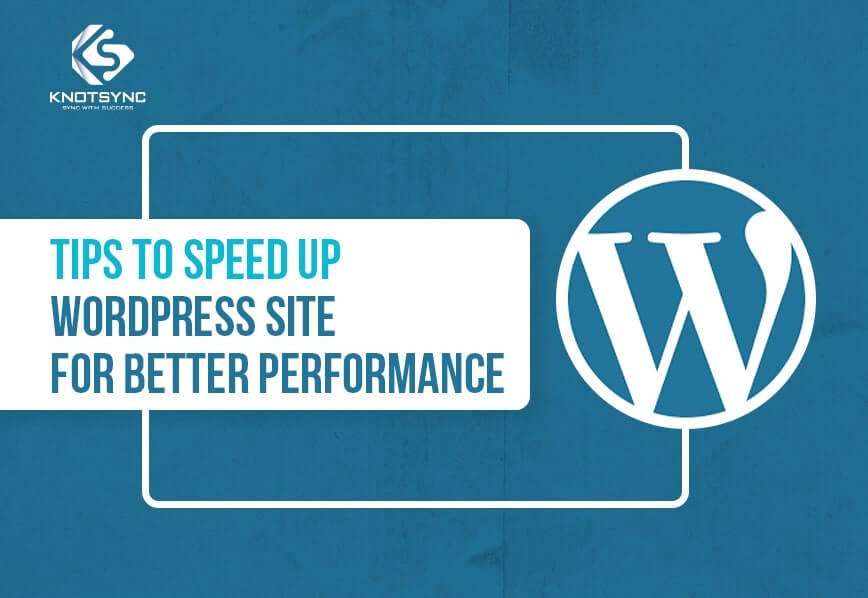In today’s digital age, everything revolves on speed and efficiency. It’s safe to assume that if your website takes longer to load than it should, your visitors will suffer, as will your business line. Many developers and business owners are now aware of this reality and want to discover how to speed up WordPress sites.
We’ll tell you how you can speed up your WordPress site but first let us tell you why you need to improve the speed of your site.
Why is Site Speed Important?
The first impression is the last impression. It takes a few seconds to attract or lose a visitor to your website. The visitor will come to your website, but if it takes too long to load, he will leave and go to another site. According to Kissmetrics research, nearly half of consumers anticipate a page to load in two seconds or less. It says that if a website takes longer than two seconds to load, customers will leave.
That is why the best thing you can do for your business is to have a fast WordPress site. If you do not do so, you will undoubtedly lose money and traffic. But how to do it? Don’t worry, we’ve got you covered. So, let’s look at some basic tips and tricks for making WordPress sites faster:
Tips to Speed Up WordPress Websites
The websites that load quickly appear higher in Google search results. If your website loads quickly, more people will visit it. So, you should prioritize speed if you want your website to appear at the top of Google’s search results. Let us look at different ways to achieve that.
1. Select a WordPress Hosting Plan That Is Quick
Web hosting is a service that allows you to publish your website on the internet. The performance of your WordPress site is influenced by the hosting plan you choose, as different plans offer different amounts of bandwidth and resources. Understanding your website’s requirements will help you in selecting an appropriate web hosting plan. Before choosing a WordPress hosting service and plan, think about the size of your website’s content and expected traffic. The following are some of the best WordPress hosting companies:
- Hostinger- provides low-cost WordPress hosting plans with a wealth of features, such as developer-friendly tools and LiteSpeed Cache.
- NameHero- provides a cloud-based WordPress hosting service with unlimited SSD storage and a free Secure Sockets Layer (SSL) certificate on all plans.
- Liquid Web- provides managed WordPress hosting with a lightning-fast average load time. Exclusive premium features are included in all managed WordPress hosting plans.
2. Choose a Lightweight WordPress Theme
Another factor that affects the speed of a WordPress site is the theme’s size, mobile adaptability, and coding. To pick a fast WordPress theme, consider the following criteria:
- Check the size- All JavaScript (JS) and Cascading Style Sheets (CSS) files are less than 100 KB in size. The majority of WordPress themes come with lightweight files.
- Follow the guidelines- W3C and WordPress theme development guidelines should be followed when writing optimized code.
- Mobile responsiveness – The theme’s design adapts to different screen sizes without slowing down the loading time.
Always try the demo website first to prevent installing a slow WordPress theme. Then, use a speed test tool like Page Speed Insights to check the theme’s performance. Performing a speed test helps determine which theme is better for your WordPress site.
Below are some lightweight themes that can improve your WordPress site’s performance. They all have scored 99 to 100 on the speed test:
- Suki– It focuses on improving Search Engine Optimization (SEO) with its flexible design.
- Neve- comes with a minimalist design that is responsive to different device screens.
- Zara – uses lightweight code with a fully optimized design for performance.
- Generate Press – offers a lightweight theme that focuses on speed and usability.
3. Install a Good WordPress Caching Plugin
WordPress speed optimization plugins are additional tools that you may use to improve the speed of your WordPress site. To assess the performance, utilize a speed test tool like Page Speed Insights. A speed test can greatly help you figure out which theme is best for your WordPress site.
The following are some lightweight WordPress themes that will help your site operate better:
- W3 Total Cache- saves up to 80% bandwidth usage with Hypertext Transfer Protocol (HTTP) compressions and AMP support. It can also cache browsers and databases.
- WP Rocket- offers WordPress caching and minimizes CSS and JavaScript files.
- WP Fastest Cache- offers various optimization and caching features, including minifications and SSL support.
4. Optimize Images
Images are like honey that attract users to websites like bees and provide visual context for the content. But unoptimized photographs can cause your WordPress site to load slowly. For this reason, it is essential to optimize all images in your WordPress media library. Using the correct picture format, compressing images to a lesser size, and adopting lazy loading are some of the most common approaches to optimize photos.
While optimizing images, take care of the following:
- Image Formats- Image formats can aid in determining the amount of server resources required by your website. Choosing the right design allows you to show high-quality images without using up too many server resources.
- Image Size- Image size is another important aspect of image optimization, as excessive image sizes can slow down a WordPress site. For faster loading, the images should be under 500KB in size.
- Lazy Loading- This strategy speeds up a WordPress site by only loading the images that are currently visible on the visitor’s screen. When you lazy load images, you save data, resources, and processing time by avoiding the need to load images that your visitors will never see
5. Make Use of Content Delivery Network
A content delivery network (CDN) is a collection of servers placed in various locations worldwide that work together to deliver internet content more quickly around the world. It’s a fantastic technique to boost the speed of WordPress sites with a global audience. Your website’s static content is cached by the data center when you use a CDN. As a result, your content will be loaded quickly by the server closest to your visitor’s location. A CDN can also help improve latency by reducing the number of external HTTP queries.
6. Remove Unused and Outdated WordPress Plugins
Plugins for WordPress expand a site’s functionality and features. But they might increase the size of your WordPress site’s database queries and files. Your site’s load time will be slowed if you use too many plugins.
To make your WordPress site load faster, remove a few plugins that are no longer in use or are old. It’s important to remember that simply turning off those plugins won’t make your WordPress site run faster. Delete the files for any plugins that are no longer in use. If you’re using shared hosting for your WordPress site, keep the number of plugins under ten to avoid slowing it down.
7. Number the Pages of Comments Section
Getting comments on your posts shows that your visitors are interested in what you have to say. On the other hand, words increase server load and can cause your WordPress site to slow down. Paginating the comments section is another approach to boost the speed of your WordPress blog. This method improves the speeding up of your WordPress site by breaking the comment section into pages. With a shortened page length, the overall loading time will be reduced, and so will the readability be.
Final Words
If you ignore the problem of slow loading website for too long, you risk jeopardizing your website’s future growth. You can hire an expert to optimize your website if you don’t feel comfortable doing it yourself. An expert can assist you with speeding up your website and ensuring that it operates as swiftly as possible. This is where Knotsync can help! With our web development services, we can assist you in optimizing your WordPress website to run as quickly as possible. To learn more about our services, Get in touch!




